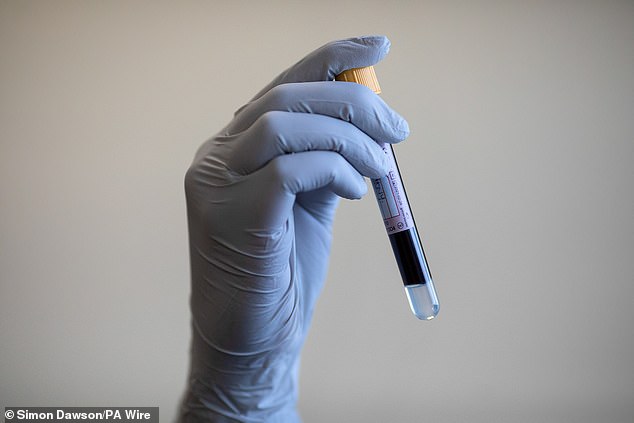A simple blood test could predict Parkinson’s up to seven years before symptoms appear, representing a “huge step forward” in diagnosis.
The disease is a condition in which parts of the brain become progressively damaged, causing tremors, slowness of movement and memory problems.
There is currently no cure, but experts believe that earlier diagnosis would help find treatments that could slow or even stop the disease.
The new test uses artificial intelligence (AI) to predict someone’s chances of developing Parkinson’s, which is caused by the death of nerve cells in the part of the brain that controls movement.
When these nerve cells die or are damaged, they lose the ability to create an important chemical called dopamine.
The test works by looking for eight proteins in the blood that have been linked to the disease. Tests on 72 people found it was able to detect the likelihood of someone developing Parkinson’s with 100 percent accuracy and up to seven years before any symptoms appeared.

Knowing the symptoms of Parkinson’s can allow earlier diagnoses and access to treatments that improve patients’ quality of life.
Currently, people with Parkinson’s are treated with dopamine replacement therapy, which can help maintain quality of life for as long as possible.
But it is thought that earlier diagnosis and treatment could help protect dopamine-producing brain cells, preventing symptoms from appearing in the first place.
Lead author Professor Kevin Mills, from the Great Ormond Street Institute of Child Health at University College London (UCL), said: “As new therapies become available to treat Parkinson’s, we need to diagnose patients before they have symptoms developed.
‘We cannot regenerate our brain cells and therefore need to protect the ones we have.
“We currently close the stable door after the horse has escaped and have to start experimental treatments before patients develop symptoms.”
The test works by looking for eight proteins in the blood that have been linked to the disease.
Tests on 72 people found it was able to detect the likelihood of someone developing Parkinson’s with 100 percent accuracy and up to seven years before any symptoms appeared.
Co-senior author Dr Michael Bartl, from the University Medical Center Goettingen, and Dr Jenny Hallqvist, also from UCL, said: “By determining eight proteins in the blood, we can identify potential Parkinson’s patients with several years of anticipation”.
“This means that drug therapies could be administered at an earlier stage, which could slow the progression of the disease or even prevent it from occurring.”
Professor David Dexter, director of research at Parkinson’s UK, which co-funded the research, said: “This research represents an important step forward in the quest for a definitive, patient-friendly diagnostic test for Parkinson’s.”
“Looking for biological markers that can be identified and measured in the blood is much less invasive than lumbar puncture, which is increasingly used in clinical research.”
The team said that, with sufficient funding, the test is expected to be used by the NHS within two years.
They suggest that with more research, this test could potentially distinguish between Parkinson’s and other conditions that have some early similarities.
Around 153,000 people in the UK already live with Parkinson’s, and it is the fastest growing neurodegenerative disorder in the world.
The research was published in the journal Nature Communications.


